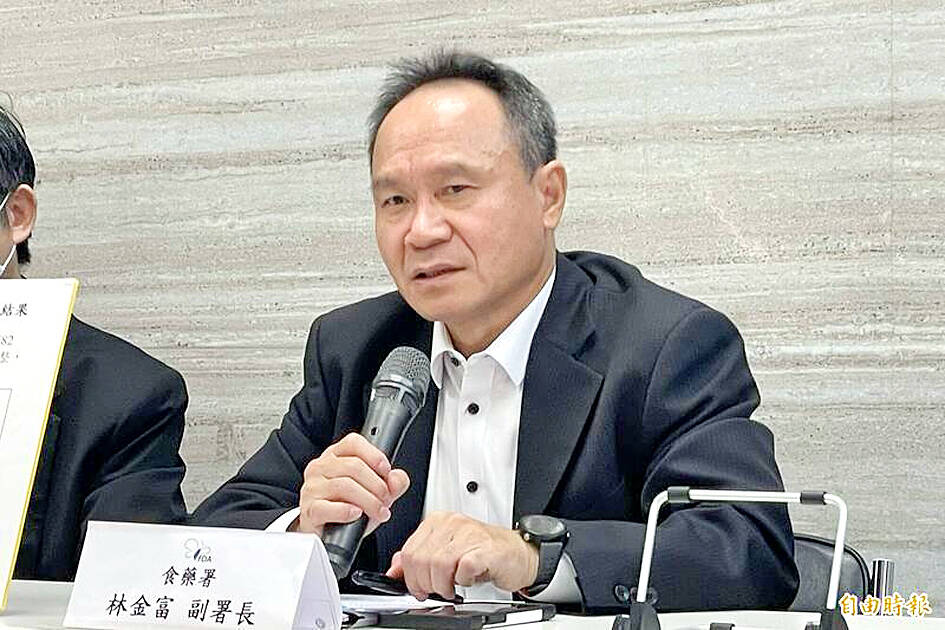A batch of paprika extract from India was found to contain Sudan IV, a dye banned in food in Taiwan, the Food and Drug Administration (FDA) said yesterday. It is one of 13 imported food-related items that failed recent inspections.
A shipment of 200kg of paprika extract product named “Paprika Oleoresin 40,000 O/S Free Methanol” manufactured by Bos Natural Flavors Ltd in India was found to contain 14 parts per billion of Sudan IV, the FDA said, adding that the shipment was ordered to be destroyed.
Sudan reds are a group of industrial dyes classified by the International Agency for Research on Cancer as Group 3 indirect carcinogens and are banned in food in Taiwan.

Photo: Chiu Chih-jou, Taipei Times
Several batches of imported chili powder have been found to contain Sudan reds since January, so the FDA on March 22 implemented stricter border inspection measures, including the destruction of all food products found to contain Sudan reds upon discovery.
Keelung-based Yih Yuan Food Co (億元食品) imported the batch of paprika extract, FDA Deputy Director-General Lin Chin-fu (林金富) said.
It is the first time an imported paprika product from the same origin country and bearing the same commodity classification code has failed a border inspection in six months, Lin said, adding that shipments of such products would be subject to batch-by-batch inspections until May 23 next year.
The latest seizure brought the number of food products containing Sudan reds that have been intercepted at the border to four since enhanced measures for the dyes was implemented in March, with the other three batches being chili powder from China, Lin said.
Other products that failed the most recent inspections include two batches of black pepper imported from Malaysia, a batch of dried green mung beans from Myanmar and a batch of fresh celery from Vietnam, all with excessive pesticide residues, the FDA said.
The list also included sweet potato crackers from Malaysia containing a banned sweetener, shrimp chips from Indonesia with preservatives in excess of allowable limits, deer placenta powder from Australia containing a preservative in excess of the permitted concentration and fresh mikan from Japan that tested positive for a banned pesticide, it said.
The other four items that failed border inspections were from China: frozen Brama japonica containing a heavy metal exceeding allowable levels, salted slender bamboo shoots and echinacea extract powder with preservatives in excess of permitted concentrations, and wooden tongs with a coating that failed dissolution tests, it added.

US climber Alex Honnold is to attempt to scale Taipei 101 without a rope and harness in a live Netflix special on Jan. 24, the streaming platform announced on Wednesday. Accounting for the time difference, the two-hour broadcast of Honnold’s climb, called Skyscraper Live, is to air on Jan. 23 in the US, Netflix said in a statement. Honnold, 40, was the first person ever to free solo climb the 900m El Capitan rock formation in Yosemite National Park — a feat that was recorded and later made into the 2018 documentary film Free Solo. Netflix previewed Skyscraper Live in October, after videos

Starting on Jan. 1, YouBike riders must have insurance to use the service, and a six-month trial of NT$5 coupons under certain conditions would be implemented to balance bike shortages, a joint statement from transportation departments across Taipei, New Taipei City and Taoyuan announced yesterday. The rental bike system operator said that coupons would be offered to riders to rent bikes from full stations, for riders who take out an electric-assisted bike from a full station, and for riders who return a bike to an empty station. All riders with YouBike accounts are automatically eligible for the program, and each membership account

NUMBERS IMBALANCE: More than 4 million Taiwanese have visited China this year, while only about half a million Chinese have visited here Beijing has yet to respond to Taiwan’s requests for negotiation over matters related to the recovery of cross-strait tourism, the Tourism Administration said yesterday. Taiwan’s tourism authority issued the statement after Chinese-language daily the China Times reported yesterday that the government’s policy of banning group tours to China does not stop Taiwanese from visiting the country. As of October, more than 4.2 million had traveled to China this year, exceeding last year. Beijing estimated the number of Taiwanese tourists in China could reach 4.5 million this year. By contrast, only 500,000 Chinese tourists are expected in Taiwan, the report said. The report

Temperatures are forecast to drop steadily as a continental cold air mass moves across Taiwan, with some areas also likely to see heavy rainfall, the Central Weather Administration (CWA) said. From today through early tomorrow, a cold air mass would keep temperatures low across central and northern Taiwan, and the eastern half of Taiwan proper, with isolated brief showers forecast along Keelung’s north coast, Taipei and New Taipei City’s mountainous areas and eastern Taiwan, it said. Lows of 11°C to 15°C are forecast in central and northern Taiwan, Yilan County, and the outlying Kinmen and Lienchiang (Matsu) counties, and 14°C to 17°C